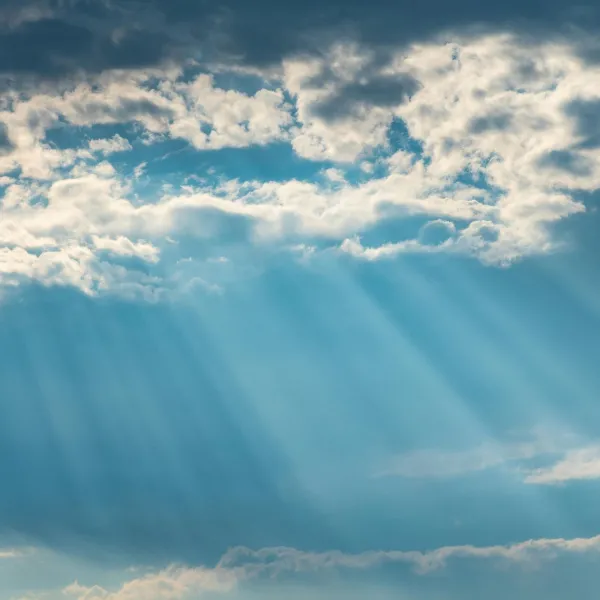Preached by the Revd Philippa White, Cathedral Precentor, on Ascension Day, Thursday 9th May 2024.
“When Christ went up to Heaven the Apostles stayed”
Gazing at Heaven with souls and wills on fire,
Their hearts on flight along the track He made,
Winged by desire.
Their silence spake: “Lord, why not follow Thee?
Home is not home without Thy Blessed Face,
Life is not life. Remember, Lord, and see,
Look back, embrace.
“Earth is one desert waste of banishment,
Life is one long-drawn anguish of decay.
Where Thou wert wont to go we also went:
Why not today?”
Nevertheless a cloud cut off their gaze:
They tarry to build up Jerusalem,
Watching for Him, while thro' the appointed days
He watches them.
They do His Will, and doing it rejoice,
Patiently glad to spend and to be spent:
Still He speaks to them, still they hear His Voice
And are content.
For as a cloud received Him from their sight,
So with a cloud will He return ere long:
Therefore they stand on guard by day, by night,
Strenuous and strong.
They do, they dare, they beyond seven times seven
Forgive, they cry God's mighty word aloud:
Yet sometimes haply lift tired eyes to Heaven—
“Is that His cloud?”
Christina Rossetti
Forty-two days ago, the disciples suffered a shocking, sudden and traumatic bereavement. Jesus – their friend, their master, their teacher, the one who had called them to follow into something new, had been brutally murdered. He was gone.
Forty days ago, the disciples experienced a sudden and shocking joy. Jesus was alive. He was there. He was with them.
And for forty days he stayed with them – unpredictable enough that they couldn’t assume it would go back to being the same as it was, but still the same Jesus. Teaching and leading and calling and healing. Healing, above all, his shocked and traumatized disciples.
Since the 1990s, psychologists have identified a phenomenon called post-traumatic growth. Not always, but sometimes, people who have had deeply traumatic experiences find themselves changed – not broken, or not only broken, but reshaped. It takes time and space, resources and support – all of which, I think, we see in the forty days of Easter, when Jesus is with his disciples to guide them from trauma into growth.
So the disciples who accompany Jesus to the mountaintop, who stand there looking up to heaven, are different people from the disciples who fled rather than accompany Jesus to the cross. They have been broken, and they have been healed, and in the breaking and the healing they have also been reshaped: into people who are ready for the Spirit, who can cope with the presence of God in a more abstract way, who can do God’s will without Jesus being physically there with them.
And yet. The feast of the Ascension is always celebrated with great pomp and joy, as a day of triumph – but I always think that isn’t where the disciples were. Rossetti’s poem with which we began captures that well: they have grown, they have changed, they have been healed and reshaped… but they don’t actually want to be sent out to do God’s will without Jesus physically there with them. They’d rather it went back to how it had always been. They want Jesus back. They are called to be in a new place, but they miss the old place – the old way of being.
Perhaps the disciples had a way to go – more healing to do, more changing and developing to do, more growing in understanding of who Jesus was and what he called them to do. And perhaps, as Rossetti suggests, they do it despite the real loss they are experiencing with courage and strength, and yet with a constant hope for things to go back to the way they had been.
So perhaps they haven’t finished their post-traumatic growth – or perhaps we expect too much of them. Perhaps it’s legitimate for them to mourn what they have lost, and to be anxious and less than enthusiastic when faced with a new and challenging future. Perhaps the brokenness that reshapes them will always ache a bit, even healed.
And perhaps if that is true for the disciples, it is true for us too. Perhaps we should not expect too much of ourselves; perhaps we too are allowed to feel grief and anxiety and brokenness; and perhaps it’s by allowing ourselves to feel those, and to hold them in tension with Jesus’s promises that he will not leave his people comfortless, that we can enter into the growth which reshapes us.
In the Ascension, Jesus takes our humanity to the heart of heaven; Jesus promises that he will not leave us comfortless; Jesus tells his friends to wait for the Holy Spirit. Those are all reasons to celebrate it as a day of triumph. But Jesus also leaves his friends behind – plunges them, ready or not, into a new way of being. We do not have to make the triumph erase the pain. Joy and pain, courage and fear, doing and waiting: they coexist; and it is that coexistence, with the promise of Jesus and the Holy Spirit whom we await, which offers us a way through grief into growth, and through pain into purpose.
They do, they dare, they beyond seven times seven
Forgive, they cry God's mighty word aloud:
Yet sometimes haply lift tired eyes to Heaven—
“Is that His cloud?”

